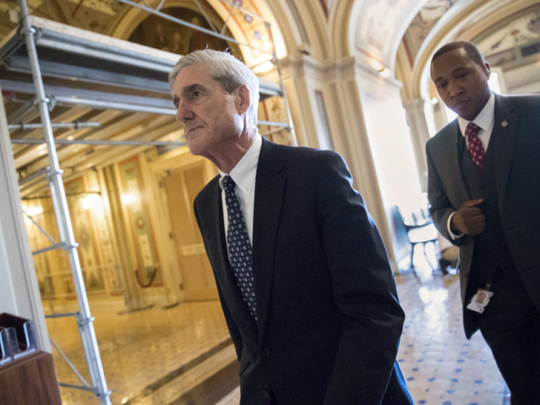
Commentators who assert that revelation of a grand jury in federal court in Washington to investigate possible criminal wrongdoing is no big deal, have a point. Technically, this is just one more step in the prosecutorial process, allowing for testimony under oath and subpoenas for documents. We already knew this investigation was no “hoax” and was anything but “fake” when Robert S. Mueller III assembled an all-star cast of 16 lawyers. That’s indicative of a major, serious investigation.
It bears repeating that no one as yet has been indicted, let alone convicted, of anything, and everyone, including the president, enjoys a presumption of innocence. However, in some practical and political ways the grand jury is a key milestone.
For one thing, when the grand jury starts taking testimony under oath from witnesses, we’ll have a good sense of where this is going. If the witnesses are largely or entirely people involved in President Donald Trump’s team members’ representations about their meetings with Russians, the decision to fire James B. Comey and the actions taken thereafter, we’ll know the emphasis is on possible obstruction of justice, lying to the FBI, lying or giving incomplete information to Congress, witness intimidation, etc. (In this regard, using a grand jury in Washington may also be seen as a step a prosecutor would take to prepare for indictments in the jurisdiction in which the alleged crimes were committed.)
Second, while prosecutors and court personnel cannot discuss the grand jury testimony, witnesses are free to do so absent a gag order. Expect a flood of leaks from those “with knowledge of the testimony”. These will likely come from witnesses/potential defendants and/or their attorneys, who will immediately claim that the leaks came from the prosecutor and hence are illegal.
The press will need to decide if and when this arises how to avoid being used in such fashion while providing the public with as much information as readily available. (“Sources close to the witnesses” or some such designation would seem to be the fairest approach.) However the leaks are spun, we’ll almost certainly hear a lot about what went on inside the grand jury room.
Third, for most witnesses, testifying before the grand jury is terrifying. Under normal rules (more about that in a moment) you cannot bring in your lawyer. A misstatement under oath may have dire consequences. This makes testifying in front of Congress look like a coffee klatch at Starbucks.
Fourth, if Mueller is investigating the American president’s role, if any, in obstruction or other similar crimes, in all likelihood, he would need to obtain Trump’s testimony. We have precedent from the Monica Lewinsky matter for a president to testify to a grand jury. In the case of former president Bill Clinton, he was allowed to testify via closed-circuit TV. Trump would be obliged to appear, although he may be able to work out the same arrangement that Clinton did, whereby, he was allowed to have his attorney present and take breaks to consult. (“Normally, grand jury witnesses, while not allowed to have attorneys in the grand jury room with them, can stop and consult with their attorneys. Under our arrangement today, your attorneys are here and present for consultation and you can break to consult with them as necessary,” the prosecutor conducting the questioning told Clinton in 1998.)
Trump would have the right to take the Fifth, but that would be an extraordinary event without historical precedent. And of course Trump’s previous declarations that people do not take the Fifth unless they have something to hide would come back to haunt him. (“The mob takes the Fifth Amendment,” Trump said during the campaign. “If you’re innocent, why are you taking the Fifth Amendment?”) That would have substantial political ramifications, to put it mildly.
Trump’s testimony, if he chose not to invoke the Fifth, would be his attorneys’ worst nightmare. Imagine trying to keep him from inadvertently giving prosecutors all the ammunition they would need. (Think about the Lester Holt interview when he freely admitted he had Russia on his mind when he fired Comey.)
If you are banking on Mueller indicting a sitting president you’re probably going to be disappointed regardless of where the facts lead. Mueller would be bound by the existing Justice Department opinion that a president cannot be indicted. All of that is down the road and will be determined by the evidence the special prosecutor’s team uncovers. However, with the grand jury plugging away, multiple witnesses including those who have an incentive to make deals with the prosecutor for testimony, the possibility of exceptionally serious consequences for the president have increased. Moreover, with clear warnings from Republicans against firing Mueller, Trump’s fate to a very large degree rests with Mueller. No wonder he is trying to smear and discredit him.
— Washington Post
Jennifer Rubin is a Washington Post columnist.








